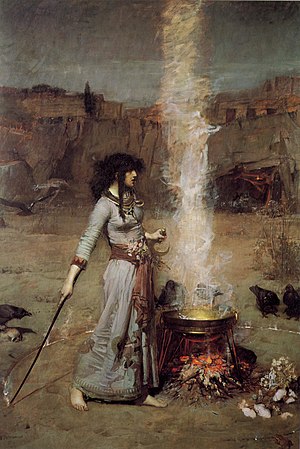Not a book for general reading, of course. I selected
this book as a research source; to discover certain aspects of magic for a
fantasy I’m currently writing. I try to approach such things with a mind as
open as possible, in case prejudice should blind me to things I might otherwise
miss.
I think what struck me most about the book, apart from
the arcane style of the prose, was the combination of detailed instruction with
a type of carelessness that I found endearing. If devotees are unable to
duplicate exactly the requirements for a given spell or charm, the author
allows them some leeway. But, at the same time, there’s an insistence on using
the exact ingredients, the appropriate time of day, the right season, even the
correct manner of dress, that was amusing.
Of course, the very idea that a mix of herbs, or
inanimate objects inscribed with runes, epithets or Latin sayings, can possess
any magical powers is anathema to the logical and rational mind. To indulge in
the practices described in the book, with any personal hope of success,
requires the reader to suspend disbelief and adopt an emotional response based
in superstition and folklore. There’s much here that echoes the rites and
rituals of many religions, of course. And this is the reason that witchcraft
was so brutally suppressed by the early Christian church in particular. In some
senses it was seen as a mockery of the rituals of the bread and wine, even
though these symbols were, in fact, actually borrowed from witchcraft, of
course. The same can be said of the various religious holiday celebrations:
Paganism usurped by the newer prejudices and ignorance of the church.
 |
| "Magic Circle" by John William Waterhouse, 1886 (Photo credit: Wikipedia) |
But I digress. Was the book of any use in my research?
Certainly. In fact, I’ll have it close by whilst I write, so that I can consult
the text and bend the ideas to fit with my own imagined world. There’s no doubt
that human beings have a deep need of ceremony, rite and ritual. We have an
almost instinctive need to mark certain phases in life, certain events. The
failure of modern religious practice to convince populations of the validity of
their creeds has opened a vacuum in society. The once accepted celebrations
surrounding birth, marriage and death have ceased to have the deep meaning they
used to contain; ignorance and faith have been replaced by knowledge,
questions, and doubt, so that we now have relatively meaningless social
ceremonies in place of sacred rites that spoke to the emotions of the celebrants.
Again, I digress, but it’s a pointer to the content and
style of the book that it drives me along these particular routes. I was
‘charmed’ by the language and the attention to detail. The underlying
suggestive tone that the author actually might believe in the efficacy of the
preparations, concoctions, ceremonies and rites she describes amused me without
causing me concern. The whole approach is, in general, harmless enough. And, in
those cases where a spell or charm is designed to do harm, the author either
advises against its use or, at least, cautions the potential user to give the
matter serious consideration of the possible outcome. Rather like warning the
hired assassin that his activities may result in the death of the intended
victim, I thought. Except, of course, that there’s little doubt about the outcome
of the killer’s bullet, whereas serious doubt exists about the result of the
spell or charm.
So, if you’re seeking an informed source of magical
incantation to use in your fiction, relating to witchcraft and it’s more material
concerns, this may well be the book for you. If you’re already an adherent of
the ways of witchcraft, I’ve no doubt either caused you distress (not
intentionally: I’m simply applying a rational analysis) or risked the prospect
of a painful curse. But, since I’ve spent my life deliberately walking under
ladders and courting the disapproval of the superstitious, I shan’t lose any
sleep over that possibility. This is a book you can either skim for its
esoteric erudition or grasp to your breast with conviction, depending on your
own particular predilections. For me, it’s
admirably served its purpose of educating me in the ways in which those who
espouse magic, as if it were reality, look at the world, and that insight will
inform my writing of the current fantasy. So it has been a success. I leave it
to you to decide whether or not it will be of use to you.





No comments:
Post a Comment